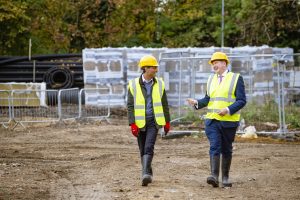 As a key government priority, the levelling up agenda continues to be reflected in ministerial engagements. Areas that are being targeted for ‘levelling up’ are consistently prioritised for ministerial visits. In recent months, these visits have increasingly included engagement with local higher education institutions. This is a welcome indicator that government recognises the important role that local universities play in enhancing social and economic equity across the country. Two such visits have been to Alliance universities, with Chancellor Rishi Sunak’s trip to Peterborough in November, and the new Secretary of State for Levelling Up, Housing and Communities, Michael Gove MP heading up to Teesside in September.
As a key government priority, the levelling up agenda continues to be reflected in ministerial engagements. Areas that are being targeted for ‘levelling up’ are consistently prioritised for ministerial visits. In recent months, these visits have increasingly included engagement with local higher education institutions. This is a welcome indicator that government recognises the important role that local universities play in enhancing social and economic equity across the country. Two such visits have been to Alliance universities, with Chancellor Rishi Sunak’s trip to Peterborough in November, and the new Secretary of State for Levelling Up, Housing and Communities, Michael Gove MP heading up to Teesside in September.
These ministerial visits were followed by Minister Donelan’s announcement on behalf of the Department for Education in December 2021, that universities will soon be required to aid in driving up standards in local schools and colleges. This announcement aims to centre universities in helping to ‘level up’ their regions through improving outcomes for disadvantaged children. Though the announcement is a lot to digest, it did go some way in proposing how higher education institutions can help improve the prospects of the people in their local communities. As Alliance universities, we already knew the impact we could have, but it is encouraging that that government has also realised this.
Education is one of the foremost tools for social, economic and cultural development in communities across the UK. It is therefore extremely welcome to see universities recognised as an important enabler of the levelling up mission. Alliance universities are particularly well placed to play an integral role in delivering this agenda. Our members have strong, historic links with their local towns and cities, which has borne out partnerships with regional industries and communities that mean each university is an anchor in their region. Indeed, a third of Institutes of Technology, which aim to offer high-quality technical education to generate employees with the skills that local businesses and industry need, now involve Alliance universities. This existing infrastructure ought to be used to the advantage of any agenda with social improvement at its core.
To this end, the levelling up funding plans are already benefitting our universities. In Peterborough, funding is being used to build ARU Peterborough – an innovative new university which will provide an important hub for training and education, in what is known as being a higher education ‘cold spot’. ARU Peterborough is a partnership between Anglia Ruskin University (ARU), the Cambridgeshire & Peterborough Combined Authority (CPCA), and Peterborough City Council (PCC) and this investment is hugely important for the region: the Cambridgeshire and Peterborough Combined Authority (CPCA) area has just 24% of 18-24 year-olds in full-time education, compared to 33% nationally.
Phase 1 of the construction, which is backed by significant government funding, including Local Growth Funding, capital investment from the Combined Authority, land investment from PCC, and Anglia Ruskin University, will establish the first teaching building for ARU Peterborough, opening its doors to students from September 2022.
Construction work for Phase 2 of the project, with £16.7m funding has also begun, which will bring a Research & Development centre to the new university campus, linking academia and industry and providing a platform for high-value net zero innovation, with plans to open in 2023.
Phase 3, which will include a second teaching building and a Living Lab, has recently secured £20m of Levelling Up funding from the government, and will provide excellent facilities for the local community as well as ARU Peterborough’s students. Anglia Ruskin University is also investing a further £4m in Phase 3 alongside £2m from the CPCA Business Board, while land of an investment value of £2m is being contributed by PCC.
This new university will not only provide skills in areas which are in high demand across many sectors in the UK, but will bring important research and innovation to the region, making Peterborough a vital source of highly skilled graduates who are ready to plug skills gaps and build the workforce of tomorrow.
The level of investment provided to the city creates a centre not only for degrees and apprenticeships, but also local enterprise, industry partnerships and opportunities to upskill and reskill the existing workforce. The presence of ARU Peterborough in the city provides scope – and indeed hope – for the levelling up of the economic, social and cultural landscape of the region.
The newly appointed Secretary of State for Levelling Up, Housing and Communities, the Rt Hon Michael Gove MP visited the National

Horizons Centre in Teesside in September last year. As part of Teesside University, this hub is an up-and-coming centre for innovative and cutting-edge research in the biosciences industry, having played a vital role during the COVID-19 pandemic in working with national and regional business to help train and upskill the vaccine manufacturing workforce.
This example is a key indicator of how fundamentally transformative this centre is for the region. Their collaboration with industry, local further education providers and NHS trusts brings academic knowledge and transfers it into real-world impact in the life sciences sector, all while helping to develop a pipeline of skilled employees for the industry. The centre is a bastion of opportunity and improvement in the Tees Valley, bringing real and tangible impact to a challenged area of the country. There couldn’t be a clearer example of the importance of universities’ role in aiding the levelling up agenda, a point emphasised by the university in an article they released this month, which highlights the importance of grounding the agenda in the specific needs and challenges of each region.
Universities benefitting from levelling up funding is an extremely important step in ensuring that they play a key role in the ambitions of the agenda. They can and should serve an even greater purpose as key collaborators when working to level up the UK. Alliance members for their part have an in-depth knowledge of their locale, and the relevant lines of communication to assist in any government decision around levelling up.
As such, they ought to be at the table in developing the forthcoming whitepaper because they know what will work for their regions. We would encourage the government to use the infrastructure available to them through universities like those within the Alliance, to help level up the UK and power a social, economic and cultural recovery from the COVID-19 pandemic.




